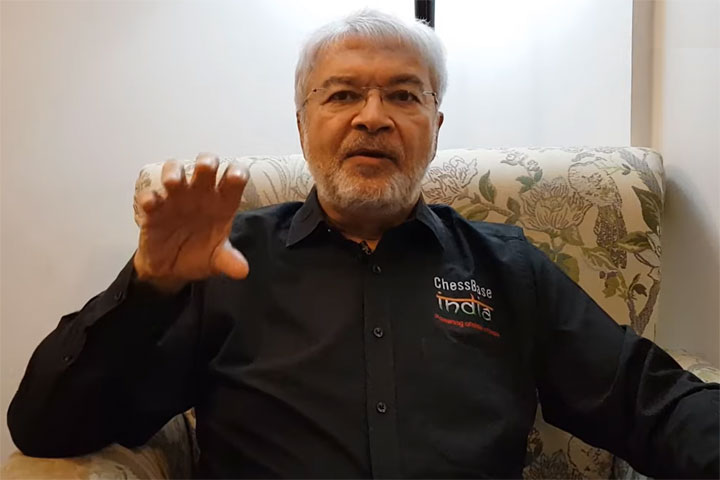


Fritz 17 - The giant PC chess program, now with Fat Fritz
The most popular chess program offers you everything you will need as a dedicated chess enthusiast, with innovative training methods for amateurs and professionals alike.
In January 2019 I visited Frederic Friedel in his hotel in Bangalore, and conducted a series of video interviews. In some chess historian Professor Nagesh Havanur took the role of the interviewer and asked Fred a number of questions about his experiences with the great chess players of the past This is Part II of the series! If you have missed part I then here it is for you to review!
Before we proceed to the interview I would like to enlist the support of our readers: please help me convince Frederic to publish a book with all his experiences around chess. From personal interaction with him I know that he has literally hundreds of stories, similar to the ones he tells below. Wouldn't that make a great book? I even have a title for the book: "Chess Encounters". Please fill the feedback sections with messages that will force him to undertake the project.
Frederic Friedel continues to relate his experiences with the legends of chess in part II of "Knowing the Greats" series. The ChessBase India recording of the interview. Transcript by Satanick Mukhuty
Prof. Nagesh Havanur: How did you meet Tal and what was your impression of him?
Frederic Friedel: I am not quite sure where I first met Tal. I think it was in Saint John, Canada. Was it a Candidates tournament? Probably not, my memory is failing me! But anyway, it was in Saint John where I met him for the first time. He was a funny guy, we had a little bit of fun. Not very much at the time because he was busy playing there.
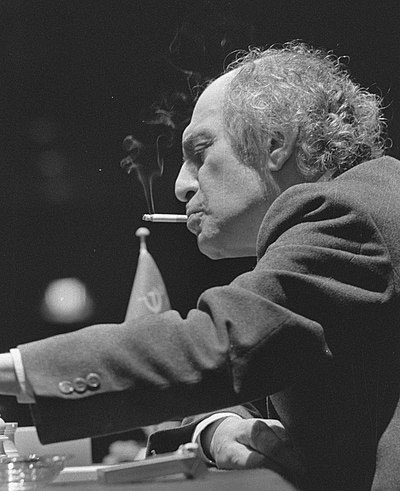 But then came the World Blitz Championship (in 1988), and this was the strongest blitz event to be ever played. I mean everyone, including Tal, was playing. It was round after round, and then in one round, I think it was right at the end, the games were about to start and Tal was not at the board. So they panicked and said, "Where is Tal? Where is Tal?" I went looking for him, like everyone else, and found him sitting in the corner of the restaurant. I went to him and said: "Michael, your game is about to start, you have to hurry." "Oh my goodness," he exclaimed and struggled to his feet. I took his hand and guided him. When you walk with someone who is inebriated, you can feel it because they kind of keep pulling you back and forth. He was inebriated. I took him to the board and he sort of plumped into his seat. I thought, "Oh god, this is a catastrophe." I mean the man was drunk, but he won his game very easily and won the entire blitz event. At least in the closing phase of the tournament he was under the influence of alcohol. But amazingly the part of his brain that plays superb chess was wide awake. This was a totally unusual phenomenon. Please do have a look at these games again. I don't know if it was the very last round but I think it was. But take a look at these games and tell me how this is possible.
But then came the World Blitz Championship (in 1988), and this was the strongest blitz event to be ever played. I mean everyone, including Tal, was playing. It was round after round, and then in one round, I think it was right at the end, the games were about to start and Tal was not at the board. So they panicked and said, "Where is Tal? Where is Tal?" I went looking for him, like everyone else, and found him sitting in the corner of the restaurant. I went to him and said: "Michael, your game is about to start, you have to hurry." "Oh my goodness," he exclaimed and struggled to his feet. I took his hand and guided him. When you walk with someone who is inebriated, you can feel it because they kind of keep pulling you back and forth. He was inebriated. I took him to the board and he sort of plumped into his seat. I thought, "Oh god, this is a catastrophe." I mean the man was drunk, but he won his game very easily and won the entire blitz event. At least in the closing phase of the tournament he was under the influence of alcohol. But amazingly the part of his brain that plays superb chess was wide awake. This was a totally unusual phenomenon. Please do have a look at these games again. I don't know if it was the very last round but I think it was. But take a look at these games and tell me how this is possible.
Professor Havanur: I am simply incredulous because I always thought I knew well about this championship but now that I have heard you, I don't think I know enough about it. That last round was special and it is fascinating that you were there in the venue as a witness. Because if you remember Kasparov, Karpov, Short everyone had been eliminated. It was only Tal and [Rafael] Vaganian, and they were great friends but at the board they were like hungry lions at each other's throats. Here you can replay the four games of the Tal-Vaganian final:
I never imagined that Tal was drunk when he came to play that last round! This first game should be looked at by everyone. Vaganian was actually winning. He could have won with a rook sacrifice, if I am not mistaken, but he missed it and then Tal made a series of sacrifices and just won! When asked after the game how he managed to win, the ever evasive Tal just said that he had two packets of Kent cigarettes before the game. Here's some original video of the last round.
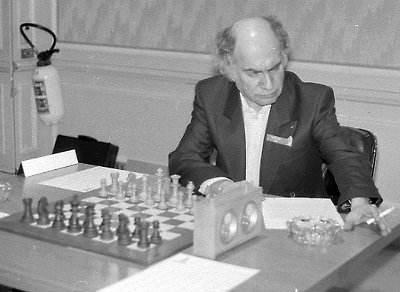 Frederic: Anyway, Tal was a wonderful person and I met him a couple of times afterwards. I remember this one time in Brussels, where he was playing (picture).
Frederic: Anyway, Tal was a wonderful person and I met him a couple of times afterwards. I remember this one time in Brussels, where he was playing (picture).
I was showing some grandmasters this problem position in the press room. I think it was given to me by [James] Plaskett, and it was very, very hard.
[Above the puzzle Frederic is talking about. It turned up decades later at a tournament in Wijk aan Zee, and Fred gives a full description of what happened there in this report. As you know you can try solving the study by moving the pieces on the diagram. An engine will try to defend against your winning attempts. If you get deeply involved there is a nice move-by-move explanation by Tryfon Gavriel in this YouTube video.]
Tal walked by, he sort of glanced at it and then went away. He wasn't interested. And he went away for a long walk in the park. When he came back he called out for me: "Where is Frederic?" So everyone had to go and search for me! "Come here I will show you the solution," he said to me. He then showed me the solution, and he was correct of course. He had walked through the park solving it in his mind.
Tal remained a friend until the end. By the way he knew that he was dying. I remember the last time I met him, he sort of said: "Okay, we'll remain friends, but it's not going to last – I'm on my way out." It was very, very sad. He was an incredible personality: his eyes, the way he looked at you, his intensity, and his humour... I treasure my shot aquaintence with him.
Professor Havanur: [08:02] Fred, you know I just want to draw your attention to a very curious kind of coincidence. You can actually call this a strange act of fate. Think of Spassky: here was a man who beat Tal, who beat Korchnoi. And when Bobby Fischer was asked to name the ten greatest players of history he actually named Boris Spassky and this was back in the 1960s. Bobby, who used to beat everyone, had lost to Spassky. It all changed in the World Championship match of 1962, but even then nobody can take away Spassky's greatness. Did you have interaction with Boris?
Frederic: Oh yes and it was a marvellous interaction. I think he came to Hamburg to promote a chess playing computer or something, and I got to know him very briefly. I remember there were many famous chess players there. It was in a department store... Let me digress a bit and tell you a little story here. I had bought a wooden chessboard and a felt pen, and I got all the chess players to sign the board – I still have that board. The head of the department store saw this and said, "This is a fantastic idea. Go get the best board we have." So he had the same thing done. Then he called the apprentice and said: "Take this into the room at the back and keep it very carefully, because of these names here." So the boy took it away. Later we had finished our dinner, and the players had all left. And then the boy came again, with the board, and said, "I tried my best, but the stains cannot be removed!" So he hadn't actually understood, he had thought he was asked to take the board and get rid of the felt pen stains on it!
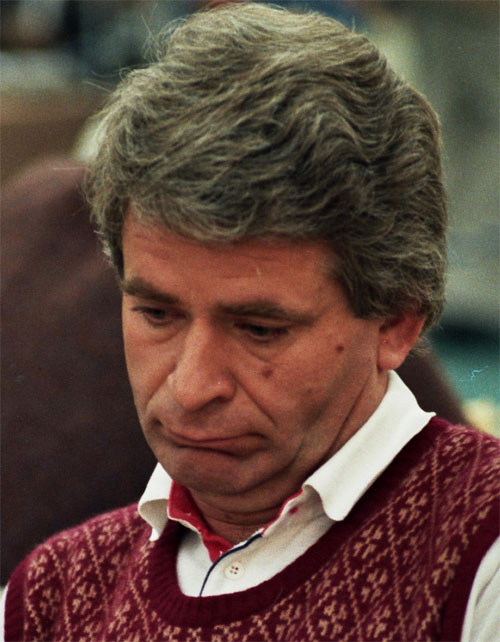 But back to Spassky. I met him on that occasion, and then I didn't see him for a long time. And then I was flying to the tournament in Saint John I told you about. Canada, snow! Our plane landed in Toronto and they said the onward flight was delayed and gave me a very nice room, in a very nice hotel, with meals and everything. I went down to dinner and suddenly Spassky [photo Gerhard Hund] walks over to me and says, "Excuse me Mr Friedel, I do not want to disturb you, but could we have dinner together?" I said, "You cannot disturb me, you are the famous person." This was one of the greatest chess players in the world coming to me in this way. So we sat down and had dinner together, and there was an endless supply of good Canadian wine. We sat there till four o'clock in the morning, or even longer, and he just told me eighty percent of everything I know about chess history - okay, maybe I am exaggerating - but he told me a lot about FIDE, his matches. He even told me about how much he was paid for his World Championship title in Moscow, and how things were run. It was incredibly valuable to me. Then every time we met, we always spoke and sometimes even had dinner together.
But back to Spassky. I met him on that occasion, and then I didn't see him for a long time. And then I was flying to the tournament in Saint John I told you about. Canada, snow! Our plane landed in Toronto and they said the onward flight was delayed and gave me a very nice room, in a very nice hotel, with meals and everything. I went down to dinner and suddenly Spassky [photo Gerhard Hund] walks over to me and says, "Excuse me Mr Friedel, I do not want to disturb you, but could we have dinner together?" I said, "You cannot disturb me, you are the famous person." This was one of the greatest chess players in the world coming to me in this way. So we sat down and had dinner together, and there was an endless supply of good Canadian wine. We sat there till four o'clock in the morning, or even longer, and he just told me eighty percent of everything I know about chess history - okay, maybe I am exaggerating - but he told me a lot about FIDE, his matches. He even told me about how much he was paid for his World Championship title in Moscow, and how things were run. It was incredibly valuable to me. Then every time we met, we always spoke and sometimes even had dinner together.
Then many years later there was a Candidates Tournament in Elista, Russia. FIDE talked me into coming there so I flew in, and when I arrived I met Spassky. He was doing commentary. We usually had lunch and dinner together, and I saw something quite extraordinary: a lot of young players crowding around us, talking to us. He was an old man, and I wasn't so young either. But they were interested in talking to Spassky. He is charismatic, you know, a head full of white hair, and so on!
Then one day I said to the organizer, 'Listen we are in "Chess City," a whole city Ilyumzhinov had built for chess. I am in Elista and I would like to see the steppe.' Ilyumzhinov said, "No problem! I will arrange for you to see the steppe." Spassky heard us and asked, "Can I join you?" – "Yes of course, that would be wonderful!" I said.
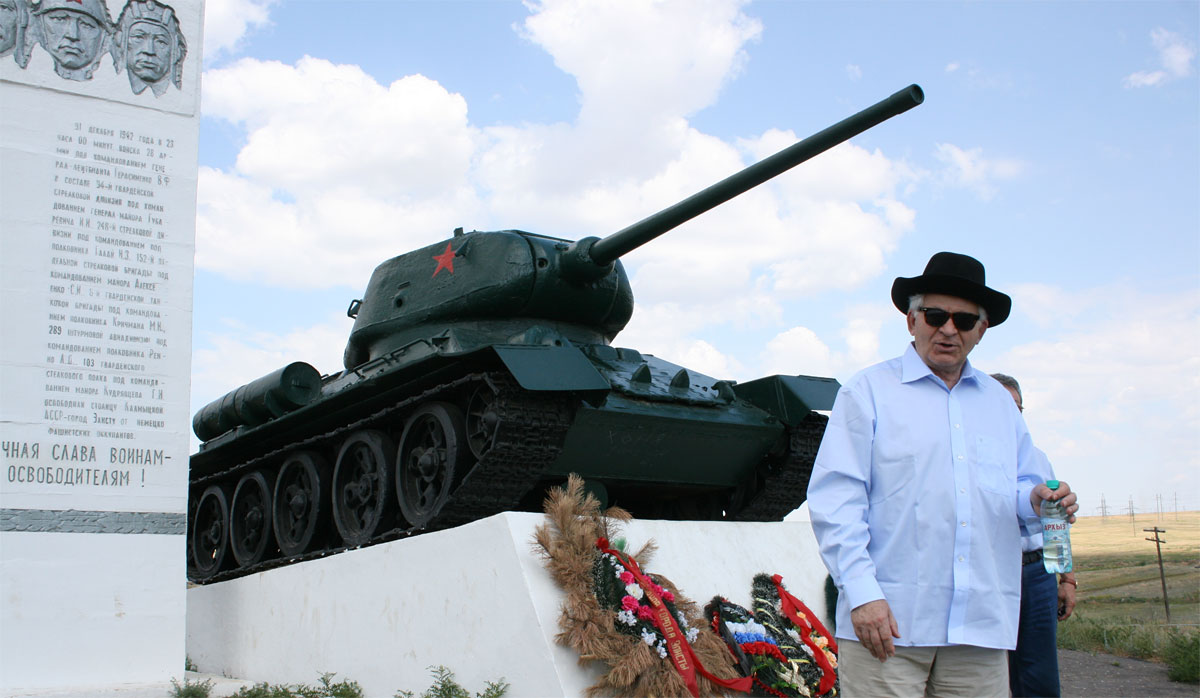
So a car arrived and they took us to – this monument of a tank. They said it was very famous. I said it was very nice, but could we go to the steppe. We want to see animals and stuff... So they took us to – a race course and said, "Look there are horses there!"
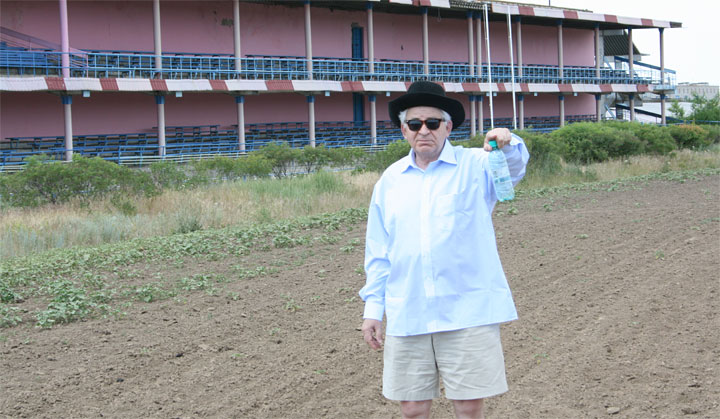
At the race course with horses in stables
After a while we gave up and decided to head back home. We came to Chess City, very disappointed and then Spassky said, 'You know if you go right to the end, the steppe starts there." I said "Yes, but there's a fence around it,' and he said 'Yes, but I know where there's a hole in the fence!" So he took me there, and he crawled through that hole.
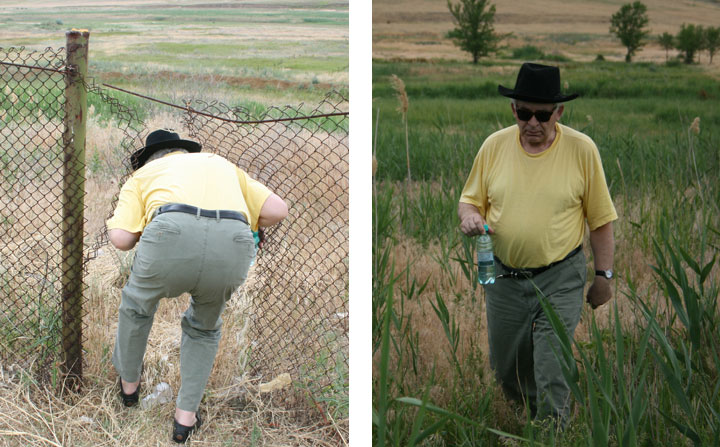
And then we went for a walk in the steppe. You know, I still have that pair of sneakers with seeds attached to it from the plant life there. We walked for many hours, we got lost in the steppe. Spassky was singing, American songs, like "Oh, What a Beautiful Morning." I asked where he got to know them, and he said, Bobby teach me!" He really knew these songs from Bobby Fischer.
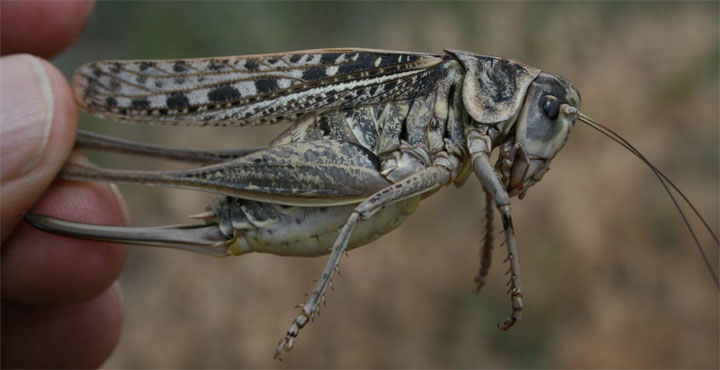 During the walk I caught some giant grasshoppers, and photographed them. Boris said "You are bravest man in the world." We had a wonderful walk. At last we found the hotel. We sat for lunch, we were late of course, and the young players came crowding around us. Boris said "Don't come close. We have been walking for many hours, and we are full of sweat."
During the walk I caught some giant grasshoppers, and photographed them. Boris said "You are bravest man in the world." We had a wonderful walk. At last we found the hotel. We sat for lunch, we were late of course, and the young players came crowding around us. Boris said "Don't come close. We have been walking for many hours, and we are full of sweat."
And then he went up his room and came back impeccably dressed for the commentary.
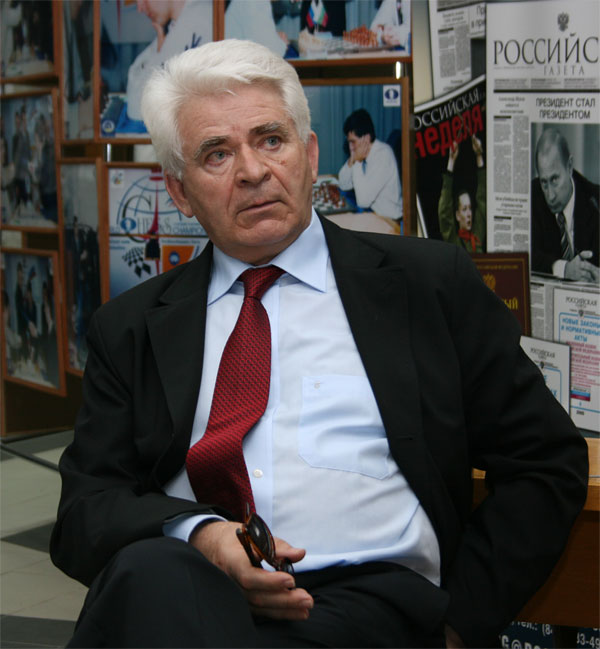 So this was a wonderful experience, for me – and for Spassky. How do I know this? Whenever I meet him, and we stand around in conversation, and I mention that we went to the steppe together, he will just cross the group of people, and come and hug me! He really enjoyed our outing in the steppe tremendously.
So this was a wonderful experience, for me – and for Spassky. How do I know this? Whenever I meet him, and we stand around in conversation, and I mention that we went to the steppe together, he will just cross the group of people, and come and hug me! He really enjoyed our outing in the steppe tremendously.
I met him in many events. His hair became whiter and he became more beautiful as a man. One day I said to him, "You are incredible. Such nice white hair you have." He said, "So it was right for me to dye my hair?" I said: "What do you mean, dye your hair?" And he said: "Do you think this is the natural colour? If I didn't dye it, it would be jet black!"
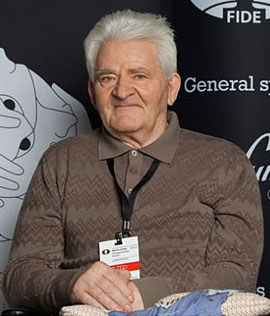 He is a very funny person. Now he has moved back to Moscow, and is becoming very frail. When I see pictures or videos of him I feel very sad. Because the man with whom I roamed the steppe was vigorous – he helped me across streams, and so on. Now he has become frail.
He is a very funny person. Now he has moved back to Moscow, and is becoming very frail. When I see pictures or videos of him I feel very sad. Because the man with whom I roamed the steppe was vigorous – he helped me across streams, and so on. Now he has become frail.
At the Olympiad in Dresden somebody asked what he did for his chess preparation. He said, "I do not prepare for chess. I am preparing for death... It's a long and very difficult endgame." It was very poignant. I hope Boris will be around for a while and I will see him again.
Professor Havanur: [20:14] There is another fate closely linked with Spassky and that is Bobby. What could you say about your interaction with Bobby Fischer?
Frederic: [20:33] Well, Bobby Fischer was the hero of my youth. I actually had three sporting heroes. Muhammad Ali in boxing, Franz Beckenbauer in football, and Bobby Fischer in chess. When Bobby played against Spassky I played over every move. I would get the newspaper the next day and then play through the game on a board. It was fantastic. Later I tried to contact him. He was living in Pasadena and I wrote letters to him – once a year, but he never replied. I also tried to phone him. A lady, named Claudia MacKaron I think, shielded him. She was from the Church of God. I remember at one stage she called me back and said, 'I don't believe you are a German. Your English is too good.' I had to explain to her that I had gone to English schools and I had studied in Oxford. Anyway, so nothing happened.
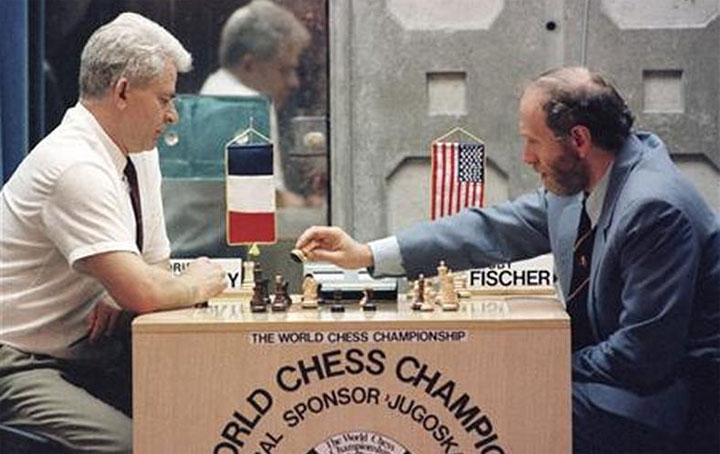
Fischerf disappeared again and then, in 1992, played against Spassky in Yugoslavia.
And then one day I was standing in my hallway, dressed, ready to go out with my wife and son, when the phone rang. I picked it up after moments of hesitation and the voice at the other end said, 'Is this Mr. Free-dell.' I said, 'Yes, who's this?' He said, 'I am Bobby Fischer.'
I said, 'Oh come on! You are really Bobby? I have been trying to contact you for twenty years now, and suddenly you call?' He said "It is actually twenty-four years. Didn't you write a hand-written message to me to Pasadena?" So I knew it was really Fischer, it wasn't a prank call. I spoke to him for an hour or more. Then he called me again and again, and I spoke to him very often on the phone. And the reason he called?
You know Bobby invented the Fischer clock, which is used universally now. It gives you a few seconds after each move. I even teased him about it and said when you lose your ability to rigorously play fast chess, you invent some way to circumvent that... And now that preparing openings was too hard for him, he invented Fischer Random Chess. "Chess, as it is now played," he said, "is called 'the old chess,' and this is 'the new chess.' The new chess is much, much better, I can beat anyone in it. I want to challenge the World Champion Anand to a match. We have decided to award this match to your company. ChessBase can stage this match. It will only cost you a couple of million dollars." I explained to him that we couldn't do that, we couldn't pay a couple of million dollars.
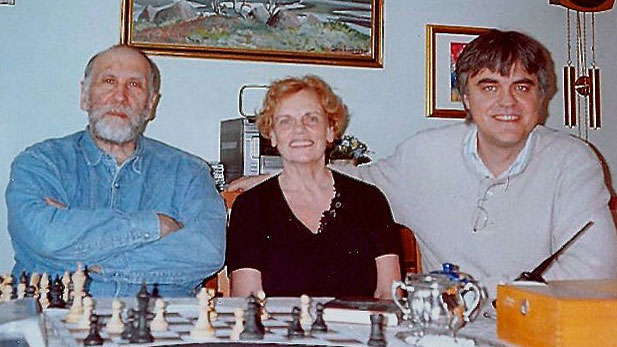
Fischer with his Icelandic friends Edda Thráinsdóttir and Gardar Sverrisson
What had happened was he had decided he wanted to play Anand, and ChessBase should finance this. He asked his only friend, Gardar Sverrisson, to talk to me and discuss it. Gardar asked me to come to Iceland. I asked him if I would meet Fischer, and he said no. So I told him to come to Hamburg, which he did. He stayed in my home, and we have been friends ever since. What happened is Fischer decided to challenge Anand in a match, and he and Gardar had concluded that ChessBase would sponsor it. But of course, ChessBase wouldn't do it. I told them that ChessBase could cough up maybe a five or ten thousand Euros for this match, but even then everyone would broadcast it, we would not have exclusive broadcast rights. I told him how he should go about it: he should announce what he told me publicly, he should say: "Old chess is dead. It has become only about preparation and theory. I have invented a new chess, and I want to challenge the current world champion at it," – and then wait for a company, maybe a Korean shoe manufacturer, or Coca-Cola, to make an offer. I said I would help with the press conference and everything. I found out then that he couldn't do the press conference in Germany, because he would be arrested for his anti-semitic remarks, which were public.
It was interesting. I was at first in awe speaking to Fischer, but after a while you lose this awe, and you start teasing him. I was saying things which nobody would believe one could say to Fischer, and he was accepting them. I teased him about his inability to learn openings, so he invented a form of chess where you don't have to learn openings. He couldn't make moves fast enough, so he invents a clock that overcomes that difficulty. I told him the next step is you should invent a form of chess where blunders can be taken back! During your game, according to these rules, you can say "I retract" and take back a blunder [later Frederic turned this into an April Fool's joke].
I was joking a lot with him, and sometimes I would also contradict him, very radically, and I used to think this is it, he is not going to talk to me again. But two days later he would call me and say, "You know, I was thinking about what you said, and I will tell you what the mistake in your thinking is." But one day he called me at two o'clock in the morning, and I said to him: "Bobby, you can't call me at two o'clock in the morning to rant about my Jewish friends. I can't take that." And that was it – he didn't call me again. I called him a couple of times, because I had some news. But it was basically over between us.
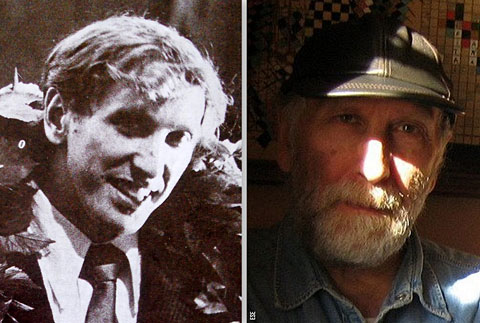
Fischer in his prime, and during his final years in Reykjavik
Unfortunately he had this kidney problem and he refused proper treatment. A year or two years later he was dead. That was a really sad thing. But I had these incredibly interesting conversations with him, and I will never forget them.
Frederic Friedel on chess greats part III on Vladimir Kramnik, Judit Polgar, Magnus Carlsen, and others will be published soon. Stay tuned!